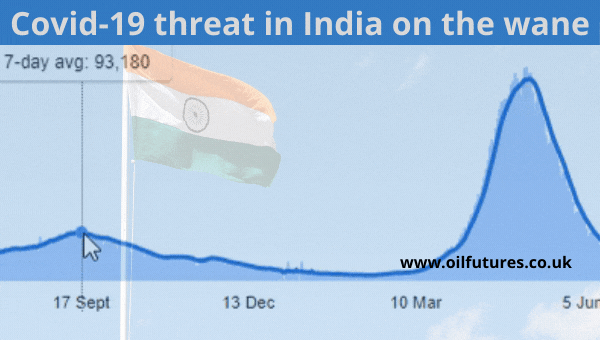The crude oil price dipped on Thursday and it was solely
attributed to the weaker-than-expected US economic data that in turn made the
US dollar stronger.
The mood in the markets was not lifted up, even
after a relatively successful summit between President Biden and President
Putin in Switzerland; that was not something expected either – at least by the
media.
The talks over the JCPOA, 2015 Iran nuclear deal,
meanwhile, are continuing in Vienna, Austria, in its sixth round and the
Iranian delegation was much more hopeful about an agreement yesterday, as never
before.
This could have been a trigger to push crude oil
price downward on Thursday, something that is still continuing on Friday.
Both WTI and Brent went down by 1.32% and 1.572%
respectively before the markets closed on Thursday.
Despite the palpable uncertainty in the crude oil
markets, there is a glimmer of hope for the battered Indian economy: the Coronavirus
infections are in decline and so are the deaths.
Since India is the world’s third largest consumer of
crude oil, analysts believe that the demand will grow steadily up, defying local
price rises of oil products in the past few weeks.
In proportion, the oil imports by India will be back
on track, especially from the Middle East. Since the strained relationship
between India and Saudi Arabia is finally on the mend, an accelerated boost
from India will reflect well on the producers in the region.
If Iran is allowed back into the international oil
markets, the wheels of oil power can move in unexpected directions, though. The
GCC, Gulf Cooperation Council that consists of mainly Sunni Arab nations in the
Middle East, has already raised concerns over a nuclear deal with Shite Iran,
without proper regulations in place; Iran recently referred to them as ‘West
Asian regimes’.
The US, meanwhile, must be under pressure from yet
another West Asian player over the issue – Israel, the arch enemy in the eyes
of Iranian conservatives.
Iranians are voting today to elect their new
president and a low turnout is a major concern, not only for the selected
candidates, but also for the Supreme Leader.
Although the outcome appears to be a foregone
conclusion, the president-in-waiting may move away from hard line policies when
it comes to international politics and economic matters, despite hailing from a
highly conservative background; increasingly optimistic mood of the Iranian
delegation involved in the talks over the JCPOA in Vienna reflects a potential change
in direction in international policies.







